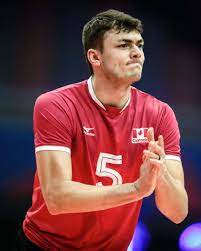Sports
Canadian Olympic Men’s Volleyball Preview 2024

One of the more interesting stories leading up to the 2024 Olympic Games in Paris was the fact that Team Canada qualified for the Olympic Games by finishing second place in an eight team tournament in China this past October. The Canadians did not need to go through the World Ranking Qualification Pathway, like five other nations had to do.
Then what we saw at the Volleyball Nations League this spring was even more steady progression. Canada posted a record of eight wins and four losses, and qualified for the quarterfinals of the VNL Final Round in Poland. That was a significant improvement from the record of three wins and nine losses at the 2023 Volleyball Nations League.
Despite the progression, Canada came up rather flat in a straight set to loss to Japan in the VNL quarterfinals. Japan scored the necessary points in a 26-24, 25-18, 26-24 win.
The quarterfinal loss was a growing trend within the Canadian volleyball program. At the 2016 Olympic Games in Rio de Janeiro, Canada looked brilliant at times (beat the United States and Italy in Pool play), but then lost to Russia in straight sets in the quarterfinals, 25-15, 25-20, 25-18. The Canadians suffered a similar fate at the 2020 Olympic Games in Tokyo in 2021. They once again made the quarterfinals, but could get by Russia, in a convincing 25-21, 30-28, 25-22 defeat.
Now with Russia being declared ineligible for the 2024 Olympic Games in Paris because on the war in Ukraine, one would think the path for the Canadians might be a little bit easier. However, the issue of consistency still seems to be an issue with this unit. There is no doubt, there is room to grow with this unit, and the overall performance in elimination games is something that has been lacking.
In a press conference with the men’s volleyball program prior to the Olympic Games, I posed a question regarding my concerns with consistency to Canadian head coach Tuomas Sammelvuo. He responded with the following answer.
“If you speak about consistency, let’s remember these are the third consecutive Olympic Games for Canada,” states Sammelvuo. “It tells something about the program, and it tells something about the consistency. Maybe this time, qualifying was harder because of the qualification system.”
Sammuelvuo was also aware of there being a change in personnel from the last Olympic Games, but believed it was important to have a mixture of Canadian Olympians who have been to the Olympic Games before and some new blood. Among the players no longer on the team are captain and outside hitter Gord Perrin of Abbotsford, British Columbia and middle blocker Graham Vigrass of Calgary, Alberta due to retirement. The Canadian leaders heading into Paris are outside hitter Stephen Maar of Aurora, Ontario, and middle blocker Arthur Szwarc of Toronto, Ontario, along with outside hitter Eric Loeppky of Steinbach, Manitoba. For Maar and Szwarc, this is their second Olympic Games. For Loeppky, this will be his first Olympic Games.
This past spring in the VNL, Canada had three very impressive wins over Japan, Brazil and the United States. However, Loeppky believes the most confidence came from the results a year ago.
“I think we got our confidence from the Olympic qualifier the previous summer (beat Argentina and Bulgaria in key wins). Tuomas had us training pretty hard that summer, and I think we found something right just in time to perform well and qualify for the games.”
Canada is in a pool at the Olympic Games alongside Slovenia (July 28 at 1pm MT), France (July 30 at 1pm MT), and Serbia (August 3 at 1pm MT). There is a different format this time around. Previously, there were two pools of six with the top four teams in each pool advancing to the quarterfinals. Now, there are three pools of four teams. The top two teams from all three pools, and the two best third place teams advance. Is a medal attainable? My thinking is it will be a challenge this time around, with Poland, Italy, Slovenia and Japan being the countries favoured to medal.









